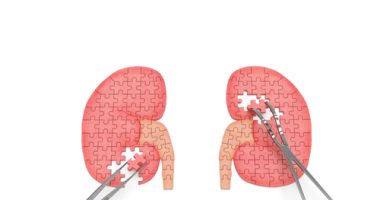Diagnosis of Alport Syndrome
Kidney Biopsy
Doctors may perform a kidney biopsy so they can take a closer look at the kidney’s filtering units, the glomeruli. Examining the tissue sample under a microscope may suggest the presence of Alport syndrome. Medical professionals can also test the biopsy for low levels of type IV collagen.
Hearing Tests
Doctors may request a hearing exam to see if a person has the high-tone deafness associated with Alport syndrome. Because the disease can affect the structure of the inner ear, the exam can help a doctor narrow down a diagnosis.
Vision Test
Alport syndrome affects the eyes as well as the kidneys and ears. In addition to a general vision exam, several more specific eye examinations are important in the diagnosis of Alport syndrome and to monitor disease progression after diagnosis. Many patients have abnormal eye pigmentation that is easily identified but does not affect vision.
Blood Tests
Since kidney problems are a hallmark of Alport syndrome, blood markers of the damage can help diagnose the disease. The extent of kidney damage can be determined by analyzing changes in blood count and levels of certain factors in the blood such as serum electrolytes, urea nitrogen, creatinine, albumin, and cholesterol.
Urine Tests
Blood and protein in urine are common symptoms of Alport syndrome. Doctors may perform a urine test to check for these conditions. Hematuria, or blood in the urine, is the most common Alport symptom. Proteinuria, or protein in the urine, usually occurs only in advanced stages of the disease.
Imaging Tests
Imaging tests are commonly used to assess the progression of kidney disease in Alport syndrome patients or to diagnose end-stage kidney disease. Several types can be used to diagnose this disease, including a renal ultrasound, CT scan, or MRI.
Genetic Testing
Once Alport syndrome is suspected, doctors can ask for genetic tests to confirm the diagnosis and determine the inheritance pattern of the disease. Knowing how the disease was passed down to a patient will give a doctor a better idea of how severe the condition will be and whether it will appear in other family members.






